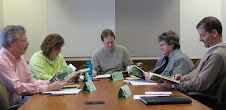--The Sacramento Bee, Feb. 2, 2008In 2002, Ireland passed a tax on plastic bags; customers who want them for their purchases must now pay 22 cents per bag at the register. Within weeks, plastic bag use
dropped 94%. Within a year, nearly everyone had bought reusable cloth bags, keeping them in offices and in the backs of cars. Plastic bags were not outlawed, but carrying them became socially unacceptable. "I used to get half a dozen with every shop. Now I'd never ever buy one," said Cahtal McKeown, 40, a civil servant carrying two large clack cloth bags. "If I forgot these, I'd just take the cart of groceries and put them loose in the boot of the car, rather than buy a bag." The tax is not so much, but it completely changed a very bad habit. The government collects the tax which is used to finance environmental enforcement and cleanup programs.
While paper bags, which degrade, are in some ways better for the envrionment, studies suggest that more greenhouse gases are released in their manufacture and transport than in the production of plastic bags.
On a similar note, according to the Associated Press, Japan will urge citizens to carry their own chopsticks instead of using disposable wooden ones.



